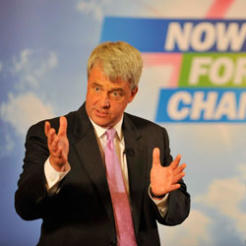The controversial lobbying bill has passed its latest parliamentary hurdle, after a fiery six-hour debate yesterday.
Labour has criticised the proposed legislation as an attempt by government “to gag charities and campaigners so they are silenced in time for the next general election”.
During the debate, Leader of the House Andrew Lansley suggested he would be open to changing the wording in parts of the bill, but appeared unwilling to budge on election campaigning restrictions contained within it.
The Transparency of Lobbying, non-Party Campaigning and Trade Union Administration Bill sets a £390,000 cap on the amount non-party organisations can spend during elections, and widens the activities included in expenditure to include items such as staff time, transport and events.
There has been a strong groundswell of opposition to the proposals from a number of groups, including charities, campaign groups and bloggers from all political persuasions.
The legislation was debated for the first time by MPs yesterday with many voicing stinging criticisms of the bill and its potential effect on campaigning by charities and other groups.
'Sinister legislation'
Shadow Leader of the House Angela Eagle described it as “one of the worst bills” a government had ever produced and accused the government of rushing it through to gag charities:
“The government designed the changes in secret and sprung them on everyone in a baleful attempt to bounce them quickly on to statute books. They have not even bothered to consult those affected. Discussions I have had during meetings with stakeholders on all three parts of the bill suggested that emails, letters and calls requesting conversations with ministers were left unanswered,” she said.
“The government did not even tell the Electoral Commission until the end of June that they were going to alter the rules, that it is required by law to police, so they have kept their own regulator in the dark.”
The Electoral Commission has also voiced concerns about the bill.
Later in the debate, Eagle called the bill “one of the most sinister bits of legislation I have seen in some time”:
“This bill twists the rules on third-party campaigning to scare charities and campaigners away from speaking out. It is an assault on the Big Society that the Prime Minister once claimed to revere.”
Lansley: Current law already has uncertainties
But Andrew Lansley insisted that the bill would not have a substantial effect on charities’ campaigning.
“Of course the bill does not constrain the ability of charities to campaign,” he said. “Let us look back to 2010. Only two charities registered for expenditure for electoral purposes and they spent very little.
“The Electoral Commission asked us to include a different and wider definition of controlled expenditure to bring it more into line with the definition of controlled expenditure for political parties.”
He added that concerns about the uncertainty around what would be considered an activity for election purposes under law was already a problem in the existing legislation.
But Lansley did say that the wording of some clauses in the bill were of concern and he would continue discussions with campaigners on these.
Other MPs in support of the bill accused those with concerns of "scaremongering" and "hysteria".
State-funded charities' campaigning
Conservative MP Jacob Rees-Mogg said: “The panic that we have had from the Opposition benches and some in the charities section is glorious to behold.”
Mogg also suggested that charities that receive money from the State should have their campaigning curtailed as part of the bill: “The NCVO received a lot of money directly from government, and they are now spending that government money lobbying the government. That seems a terrible waste of public funds. I hope the bill will be amended in the Committee to prevent that waste of public money.”
The government won the vote on the general principles of the bill by 62 votes. It will now proceed to detailed scrutiny by MPs.
Five Conservative bankbenchers voted against the bill.









